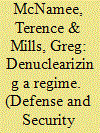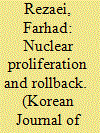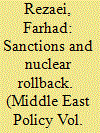| Srl | Item |
| 1 |
ID:
073793


|
|
|
| 2 |
ID:
156481


|
|
|
|
|
| Summary/Abstract |
This study seeks to provide answers to the following questions; what were the real
motivations behind Iran’s nuclear program?; to what degree did key players of
Iran’s nuclear program at a given time period fit the rational proliferator profile?;
and eventually, how did key elites agree on a unified set of parameters of rollback
in the nuclear program in exchange for the lifting of sanctions? The study has three
objectives. The first objective is to ascertain whether Iran fits the profile of a rational
proliferator. The second objective is to determine whether its response to sanctions
followed the rational modality expectations embedded in proliferation theories.
The third objective is to identify the background of the initial decision to pursue the
nuclear program with a special emphasis on key motivations and factors that helped
to drive it from a very modest beginning to a virtual breakout position.
|
|
|
|
|
|
|
|
|
|
|
|
|
|
|
|
| 3 |
ID:
076716


|
|
|
|
|
| Publication |
2006.
|
| Summary/Abstract |
The decisions to abandon the pursuit of nuclear weapons by South Korea and Taiwan represent two of the most important cases of nuclear rollback during the Cold War. The cases differ in significant ways: While Taiwan's rollback emphasized capability reductions, South Korea's nuclear rollback mainly reflected changes in intent. One similarity was that despite their precarious security environment, both reversed their nuclear programs in the face of tremendous U.S. pressure. The United States is likely to remain central to these states' future nuclear narratives to ensure that they do not restart their programs. Changes in the threat environment, shifts in relations with the United States, or the belief that no one is watching could produce worrisome policy shifts in Seoul and Taipei. Several key questions for examination include: Why did they suspend their nuclear weapons programs? What specific pressures influenced rollback? How important was Washington in the process? How significant were the reversals? What could induce them to restart the programs? Understanding Seoul's and Taipei's decision-making is crucial to understanding rollback writ large. Failure to do so may invite an era in which the long-feared "nuclear dominoes" may fall
|
|
|
|
|
|
|
|
|
|
|
|
|
|
|
|
| 4 |
ID:
095498


|
|
|
|
|
| Publication |
2010.
|
| Summary/Abstract |
Realists have been all but silent on the issue of nuclear disarmament, largely because giving up military capabilities seems counter-intuitive to realism's logic. The nonproliferation literature, on the other hand, has treated the insights of realist theory as failing to come to grips with the complex nature of a state's decision-making processes. The non-proliferation literature has produced rich empirical details of nuclear rollback; however, much of this literature lacks a general theoretical framework to provide generalizable explanations and predictions. This article advances two defensive realist hypotheses on state behaviour to explain nuclear rollback. It argues that states may voluntarily reduce their own capabilities in order to survive in an anarchic order when, in the absence of a secure second-strike capability, they make the rational decision to give up their nuclear arsenals. However, the absence of a secure second-strike capability is a necessary but not sufficient condition for nuclear disarmament. The absence of a dyadic existential threat is also a necessary condition for a state to give up its nuclear weapons. Together these two conditions, from a defensive realist perspective, are jointly necessary and sufficient for nuclear disarmament. The findings suggest that incentives for disarmament, from a realist perspective, can be made by taking into account the strategic interaction that states find themselves in vis-a-vis their environment and capabilities.
|
|
|
|
|
|
|
|
|
|
|
|
|
|
|
|
| 5 |
ID:
156850


|
|
|